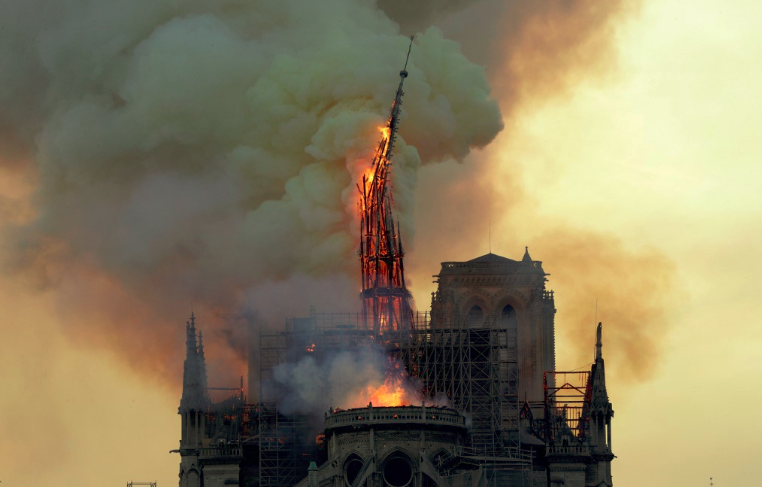April 16, 2019
All This Useless Beauty

Paris, and the world, lost something more than a wonderful piece of ecclesiastical history and architecture overnight. It lost yet another link with a transcendent past, that was once so usefully beautiful.
French writer Guy de Maupassant, and decidedly 20th century singer-poet Elvis Costello, label, both have written works called Useless Beauty, or as in Costello’s case, All This Useless Beauty.
In Maupassant’s short story, a young Countess has birthed seven children in eleven years to her husband (well, six to her husband apparently, and that’s the story). She makes her confession of her sin in a church, and rails against her perception that the Count loves her only for her beauty and her fertility.
Using the image of floral arrangement, – a theme picked up, by the way, in that most devastating of movies about useless beauty, American Beauty, and which utilises Costello’s song – , Maupassant’s story centres on the Countess’s deep fear that, for all his flattering remarks about her looks, that’s as far as his affection goes. She is something to show off the world.
Costello’s song has the same painful theme. In discussing why he came to write he, he says this:
“I was sitting in this picture gallery in Florence, Italy spending a bit of time with works they must have been when they first painted them. When they painted these pictures they didn’t have moving pictures, they didn’t have amplified sound, and I was watching people come into the room, look at these famous paintings and walk out again because they had “seen” them. I felt lucky that I had had the time to sit and observe some of the ways people looked at each other and I started thinking and this song came out. It follows a train of thought from that one little observation of a woman looking at a beautiful statue of classical antiquity and then looking at her late twentieth century husband and thinking, “where the hell did we go wrong?”
Where the hell did we go wrong? Indeed.
Just as with those paintings, so many tourists down so many years have walked past – or through – Notre Dame, having “seen” it. They have seen its beauty, but it has become a “useless beauty”, an end in itself. And even more so for the decidedly secular French, those purveyors and traders of all things beautiful. A building once dedicated to the glory of God, a call to look up to the transcendent, has become over the years an end in itself.
Notre Dame has become yet another lady, a Countess for the Count to drag into the drawing room to be admired and perhaps lusted after, in order to furnish his own preening ego.
Notre Dame cathedral is praised and admired as useless beauty in a land deeply committed to the immanent frame, and as Elvis Costello says, “Where the hell did we go wrong?”
Yet perhaps, and it’s a slim “perhaps”, the deep grief that Parisians in particular feel, as they watch their lady – their Countess -, lose her beauty in one devastating overnight immolation, makes them wonder why the are so devastated.
Wonder why it really matters in the scheme of a blind chance universe in which any idea of God has been pushed to the margins. Wonder why it matters that this church – and not the other lovely old churches in France that have been torched by protestors this past month – matters so much.
Perhaps there’s an ache in there for the transcendent. An ache that was deliberately placed in the building from its inception by its builders some 800 years ago. Builders who were as certain as the hand in front of their face, that the beauty of the building they were constructing, was, without the presence of the Most Beautiful Creator of all, simply a useless beauty.
Have a listen to Elvis Costello’s song, even as you read about the Notre Dame devastation.
[youtube https://www.youtube.com/watch?v=pi50yFMZ49E&w=560&h=315]
Written by
There is no guarantee that Jesus will return in our desired timeframe. Yet we have no reason to be anxious, because even if the timeframe is not guaranteed, the outcome is! We don’t have to waste energy being anxious; we can put it to better use.
Stephen McAlpine – futureproof
Stay in the know
Receive content updates, new blog articles and upcoming events all to your inbox.


